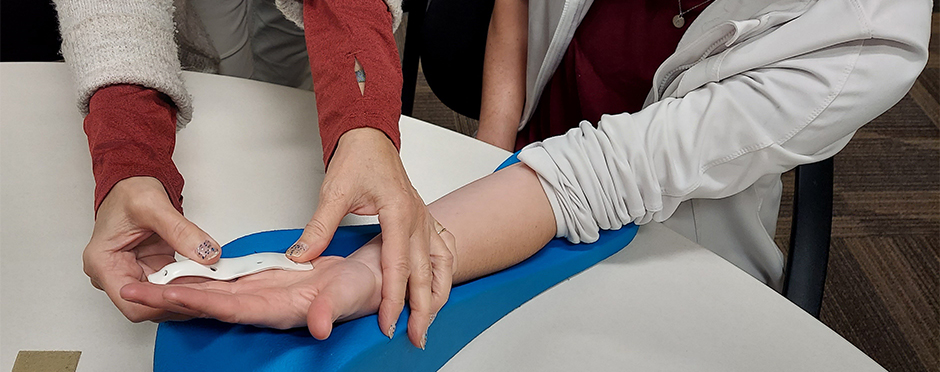
Occupational Therapy Or Hand Therapy? How To Decide Which Is Best For You
Leave a CommentOccupational Therapy
When you think of Occupational Therapy, do you think “work”? Many do! But that is too narrow. Occupational Therapy focuses on returning the student, client, or patient to daily tasks they need/want to do throughout their life. These functional tasks are labeled “occupations” and include feeding, dressing, bathing, house and yard chores, meal preparation, school work, driving, caregiving, recreation, and work too! This list is not exhaustive, and the different “occupations” importance varies with age, injury/illness, and individual goals. For example, in pediatrics, an Occupational Therapist obviously will not work on driving skills with a preschooler. Occupational Therapists evaluate and collaborate with the individual to implement a customized treatment plan and re-evaluate with functional outcome measures to assess progress toward the individual’s goals.
When Could An Occupational Therapist Help You?
Occupational Therapy could be considered whenever any physical, cognitive, visual-perceptual, or mental health issue interferes with performing your daily tasks (e.g., pediatric Occupational Therapists most often addresses developmental disabilities). An Occupational Therapist in a rehabilitation facility often address those with strokes, head injuries, spinal cord injuries, or limb amputation. In an orthopedic setting, a patient with low back pain would see a Physical Therapist for their back issues, but if getting dressed, bathing or other tasks are compromised, an Occupational Therapist could focus on ergonomics/adaptive aids to promote independence in those tasks. Also, in an orthopedic setting, an Occupational Therapist can work directly with arm/hand injuries/deficits. Thus, Occupational Therapist specialties are as varied as their settings.
Hand Therapy
When you think of hand therapy, do you think “hands”? Many do! But that is too narrow. Hand therapy addresses injuries/diseases/repetitive stress disorders to the entire upper limb from the neck to the hand. Treatment can include pain modalities, wound care, splints, technology, adaptive aides, exercises, functional tasks, activity modification, neuromuscular re-education, and/or manual therapy to assist the individual in reaching their goals for using the upper extremity in activities of daily living.
To become a certified hand therapist (CHT), a credentialed Occupational or Physical Therapist has to document 4000 hours of direct hand therapy experience and pass the certification exam. To re-certify, the CHT needs 80 contact hours of professional development and at least 2000 direct work hours in hand therapy every five years. Some therapists provide hand therapy but are not yet certified. Usually, these therapists are working toward their CHT credentialing.
When Do You Need Hand Therapy?
Whenever your hand/elbow/shoulder pain, stiffness, weakness, or sensory deficits interfere with your daily functioning or when you need recovery from surgery to any of these body parts.
A hand therapy evaluation starts with a functional questionnaire to ascertain your current functional level. Intermittently, this functional status will be reassessed throughout care to see how you are improving. The therapist will also measure the range of motion, sensation, strength, swelling, and post-surgical wound qualities. The therapist will then collaborate with the patient to develop goals and a plan of care to reach those goals. Throughout the therapy process, the therapist will monitor progress and upgrade the program according to patient gains or post-surgical protocol timing. Adaptive aids, ergonomics, technology, and orthoses (splints) can also be utilized as indicated. When goals and/or independence in the home program are achieved, a discharge plan is created through collaboration between therapist and patient.
If you have any upper extremity issues, request an appointment or free assessment at your nearest Athletico!
*Per federal guidelines, beneficiaries of plans such as Medicare, Medicaid, Tricare, VHA and other federally funded plans are not eligible for free assessments.
The Athletico blog is an educational resource written by Athletico employees. Athletico bloggers are licensed professionals who abide by the code of ethics outlined by their respective professional associations. The content published in blog posts represents the opinion of the individual author based on their expertise and experience. The content provided in this blog is for informational purposes only, does not constitute medical advice and should not be relied on for making personal health decisions.
References:
1. “Certification.” Img, https://www.htcc.org/certification/examination-information/eligibility-requirements.
2. “Recertification.” Img, https://www.htcc.org/recertification/recertification-information.
3. “Why See a Hand Therapist.” American Society of Hand Therapists (ASHT), https://asht.org/patients/why-see-hand-therapist.
4. Aota.org, https://www.aota.org/about/what-is-ot.
